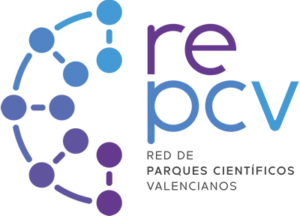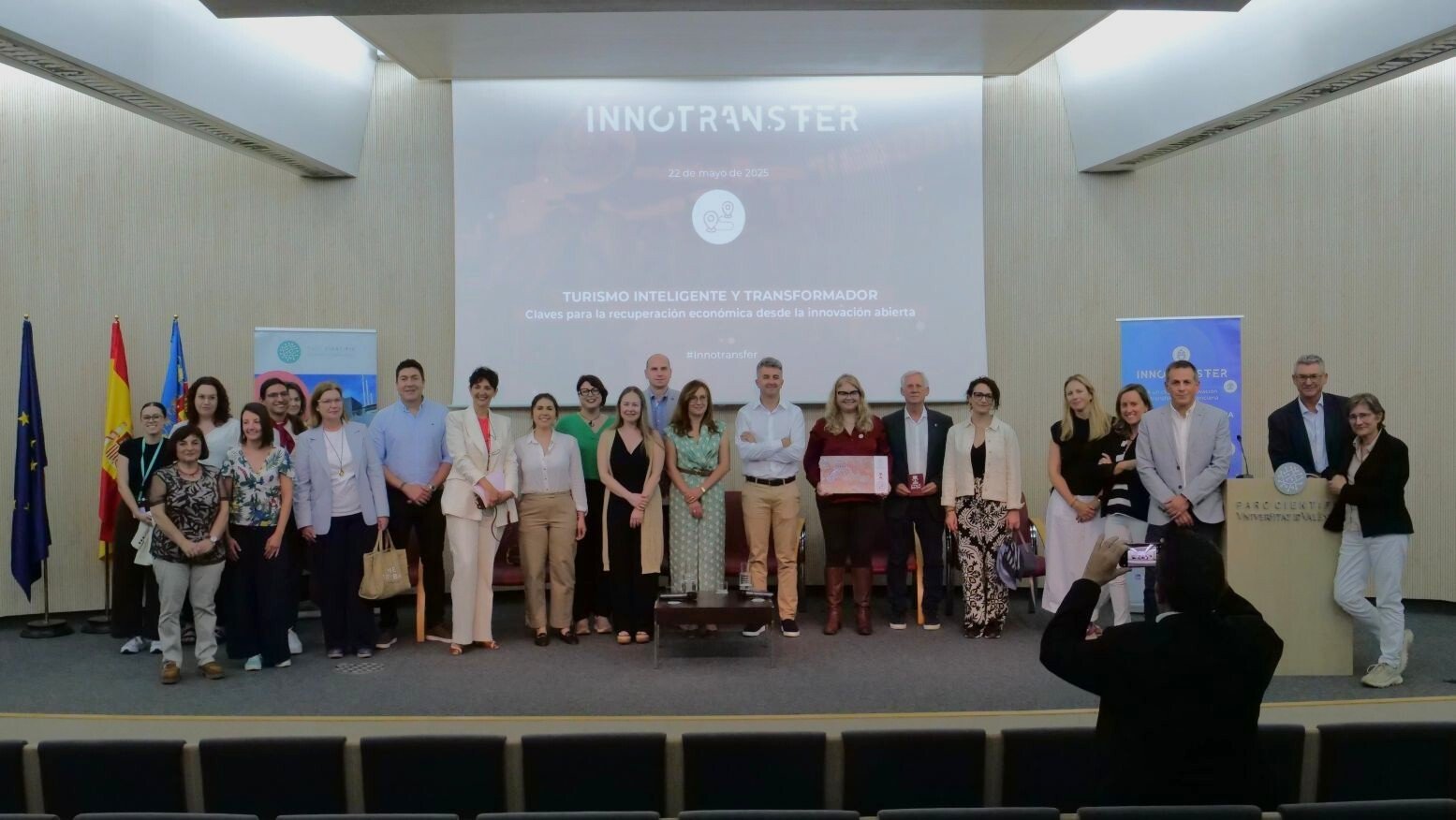Under the title "Intelligent and transformative tourism: keys to economic recovery from open innovation", the Scientific Park of the University of Valencia (FPCUV) hosted a new Innotransfer programme day on 22 May, at which academics and business experts highlighted the need to balance the well-being of visitors with the quality of life of local people. During the day there were also successful cases in the application of innovative technologies to the tourism sector, such as the management model developed in the city of Benidorm.
The Science Park of the University of València (FPCUV) held on 22 May a new edition of the Innotransfer program under the title "Intelligent and transformative tourism: keys to economic recovery from open innovation". The event, which took place in the Marie Curie Auditorium and was streamed, brought together a wide representation of professionals from universities, technology companies, public administrations and third sector organizations. The objective was to generate a space for meeting and collaboration to address the challenges faced by the tourism sector in the face of climate change, digitization and the need for more sustainable and fair models.
The event was part of the open innovation initiative promoted by the Valencian Network of Science Parks (rePCV) with the support of the Innovation, Industry, Commerce and Tourism Council of the Generalitat Valenciana. Over the course of three round tables, participants explored ways of reconciling visitor well-being with the quality of life of residents, while discussing strategies for technological integration in tourist destinations without losing sight of the human and cultural component.
Action on climate change
Pedro Carrasco, director of the Science Park, was in charge of opening the meeting with Francisco Javier Sogorb, deputy general director of Advancing of the digital society and Digital Enabling Technologies of the Generalitat Valenciana. Carrasco stressed the strategic importance of tourism for the economic and social development of the Valencian Community, but warned about the fragility of the territory in the face of advancing climate change. In his speech, he stressed that extreme phenomena such as the recent DANA in Valencia must drive an urgent transition to more responsible and regenerative models, which guarantee the long-term sustainability of the sector.
Sogorb stressed the need to articulate policies that strengthen public-private partnerships, with innovation as a key lever to transform tourism and make it more competitive and resilient in the face of global challenges.

Pedro Carrasco, director of the PCUV, opening the Innotransfer journey. Photo: FPCUV
Towards an inclusive, cultural and solidary model
The first round table was entitled "Tourism with purpose: culture, impact and solidarity" and was attended by Marisa Vázquez de Ágredos, director of Heritage at the University of Valencia; Rosa María Rodríguez Artola, Director of the Institute of Tourism of the Jaume I University; Natalia Castro, coordinator of the Platform for Solidarity Travellers in Colombia; and Esther Welters, executive director of Kalmas, a company specializing in tourism sustainability.
The speakers agreed that tourism models should integrate the reality of host communities, avoiding homogeneous strategies that ignore territorial particularities. Esther Welters stressed that solutions must be adapted to the load capacity of each destination, taking into account both the natural resources available and the social and economic needs of its inhabitants. He mentioned the case of Benidorm as an example of good planning, thanks to its urban control and efficient management of the water cycle, in contrast with La Manga del Mar Menor, where the negative effects of disorderly growth are evident.
Academic and social experts agreed that tourism must integrate the culture, solidarity and needs of host communities, promoting more inclusive and sustainable models
Natalia Castro presented the experience of "slow" tourism that drives in Colombia through the Platform for Solidarity Travellers. This model promotes a deep cultural immersion and active participation of the visitor in regenerative agriculture projects with local communities. Castro explained that work is currently underway to implement this initiative in the Valencia region, with the aim of attracting tourists who value human connection and positive social impact.
For her part, Marisa Vázquez de Ágredos explained the project Aromas Itinerarium Salutis, a non-profit initiative that manages the European Route of Historic Pharmacies and Medicinal Gardens. This tourism experience is based on the participation of small groups that interact with local people and receive knowledge about medicinal and culinary heritage. Vázquez stressed that the inclusion of people with functional diversity remains an outstanding issue, requiring customized proposals beyond what technologies can offer.
"The solutions must be adapted to the load capacity of each destination, taking into account both natural resources and the needs of the local population", Esther Welters, executive director of Kalmas
Rosa María Rodríguez closed the table with a reflection on the educational dimension of tourism. He recalled that those who travel are also residents of their own territories and that, therefore, tourism must be a tool for learning and personal growth. Stressed the importance of fostering territorial awareness and shared responsibility as pillars of purposeful tourism.

The first round table of Innotransfer: "Tourism with purpose: culture, impact and solidarity". Photo: FPCUV
Smart destination technology, data and strategy
The second round table focused on the strategic use of technology in tourist destinations and was entitled "Tourism and digitization: technology as a means rather than an end". Olivia Estrella, director of the Valencian Institute of Tourism Technologies (Invattur); Fran Vaquer, director of operations of DeepSense; Celia Romero, executive director of tourist intelligence; Gersón Beltrán, member of the board of ADESTIC; and Miguel Ángel Catalán, responsible for the Smart Office of Finestrat and co-founder of Inturtec.
Celia Romero explained that the first step to digitize a destination is to make a diagnosis of each organization’s technological starting point. Based on this analysis, a route adapted to the objectives of sustainability and digital transformation is designed. Romero argued for the need to move towards data-driven governance, where governments make informed and efficient decisions through digital tools.
Digitization is positioned as a key tool to improve the sustainability and governance of tourist destinations from a strategic and humanistic perspective
Fran Vaquer pointed out that the main obstacle to technological integration is not technical but cultural and strategic. Many institutions have digital tools or data, but lack a clear vision of their usefulness. From DeepSense, they work to facilitate the access and effective use of these solutions, especially in smaller scale destinations.
Gersón Beltrán introduced a humanist perspective by reminding us that technology cannot replace social interaction or local dynamization. In rural contexts, revitalizing community life and recovering meeting spaces such as bars or cultural centers is a priority. Technology, he said, should be a complement, not a substitute.
"The challenge of digitizing tourism is not so much technical as cultural and strategic: many organizations have tools, but they do not know why or for what they are using them", DFran Vaquer, director of operations at DeepSense
Olivia Estrella highlighted the work carried out by the Valencian Community, which has become the only Spanish autonomous with a consolidated network of smart tourist destinations. This network has been built from a cross-sectional perspective, integrating universities, science parks, innovative companies and public bodies.
Miguel Ángel Catalán shared the experience of the municipality of Finestrat, a pioneer in the implementation of the smart tourist destination model since 2016. Catalán stressed that innovation processes require continuous effort, a willingness to make mistakes and a firm commitment to constant improvement.

The second round table of Innotransfer, "Tourism with purpose: culture, impact and solidarity". Photo: FPCUV
Tourism in balance, solutions against overcrowding
The third panel, entitled "Open Eyes: Connecting sectors for future tourism," focused on the effects of tourist overcrowding and solutions to mitigate its impact. Maria José Viñals, Professor of Geography in the Department of Cartographic Engineering, Geodesy and Photogrammetry at the Polytechnic University of Valencia, coordinator of the HBIMSIG-TURISMO project; Walesska Schlesinger, Professor in the Department of Marketing and Market Research at the University of Valencia and member of the Institute of International Economics and the SIV (Innovative and Sustainable Solutions in Services) research group; Adrián Ferrandis Martínez, Doctor in the Department of Geography at the University of Valencia. Director of the Research Group on Local and Regional Sustainability (LOCSUS) at the Inter-university Institute for Local Development (IIDL) and coordinator of the European project ECOSN2K UE_SRIC_ERASMUS+; Ana Mafé García, technician in Tourism Enterprises and Activities, of the Association Way of the Holy Grail; e Ignacio Llopis, Managing Director of IOTSENS.
María José Viñals warned that the exponential increase in the number of visitors can cause health and safety risks if not properly managed. He noted that some administrations are reluctant to use tracking technologies, but that digitisation is essential to ensure the sustainability of destinations. He gave as an example the Cathedral of Valencia, which has gone from receiving 300,000 visitors a year before the pandemic to more than 800,000.
Adrián Ferrandis analysed the effects of climate change in Benidorm, where a thermal difference of up to three degrees has been detected between green areas and densely built-up urban areas. Proposed the creation of "climate shelters" in sun and beach destinations, with shadow maps and recommended routes according to time of day and solar exposure.
"Sustainability can no longer be treated as an extra: it is the basis from which any tourism model that aspires to last in time must be built", Walesska Schlesinger, researcher of Marketing and Market Research at the University of Valencia
Ignacio Llopis raised the challenges associated with the massive arrival of cruise passengers in ports such as Palma de Mallorca. He pointed out that it is essential to plan bus routes, waste collection and people flows to avoid collapses and ensure a satisfactory experience for both visitors and the local population.
Ana Mafé explained how the Way of the Holy Grail can become a tool to regenerate communities and recover natural spaces, promoting pilgrimage tourism as a way for reflection, volunteering and rural development.
Walesska Schlesinger concluded that sustainability should be understood as a basic condition of any tourism proposal, not as an added value. It proposed to diversify visitor flows towards less crowded spaces and more in need of economic stimulus.
The third panel addressed the effects of intensive tourism and proposed innovative measures such as shadow maps, climate routes and flow diversification to balance tourist development with local and environmental well-being
 Space "Open view: Connecting sectors for tourism of the future". Photo: FPCUV
Space "Open view: Connecting sectors for tourism of the future". Photo: FPCUV
The University of Valencia, nexus of innovation and development
The closing ceremony was held by Rosa María Donat, vice-rector of Transfer and Innovation of the Universitat de València. Donat highlighted the role of universities and science parks as strategic spaces to generate applied knowledge, facilitate partnerships between sectors and promote innovative solutions to local challenges.
With this new edition of Innotransfer, the Science Park reinforces its role as a driving force for change and key agent in the transition towards a more fair, resilient tourism model adapted to the challenges of the 21st century.
See the Innotransfer Conference "Intelligent and transformative tourism: Keys to economic recovery from open innovation"





